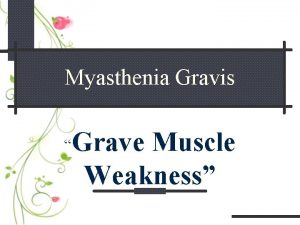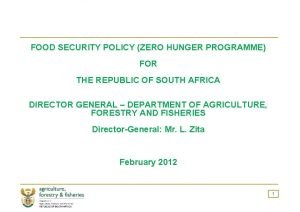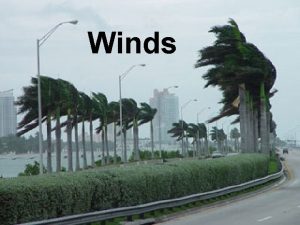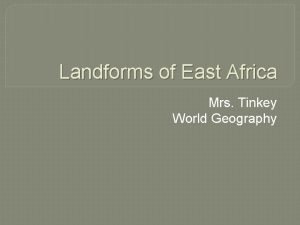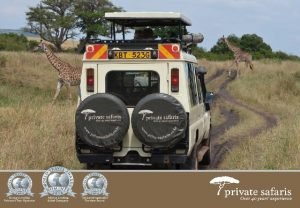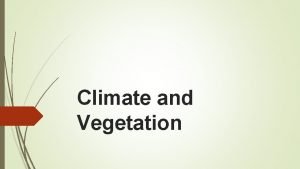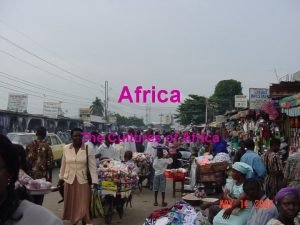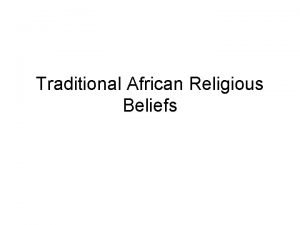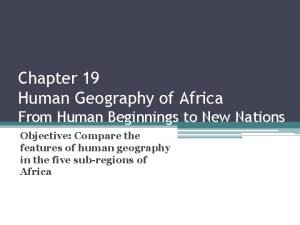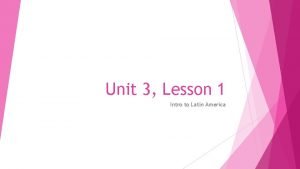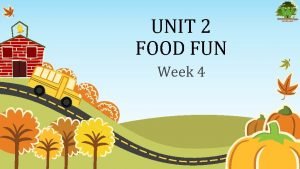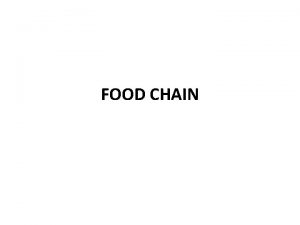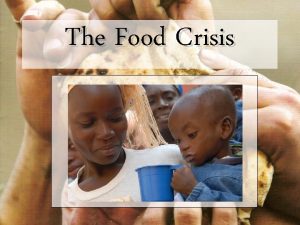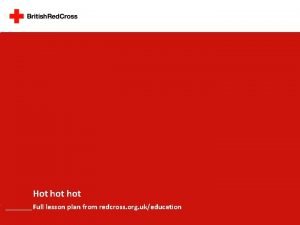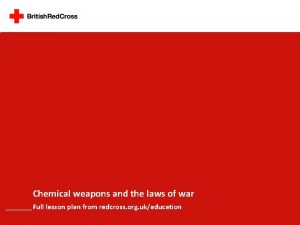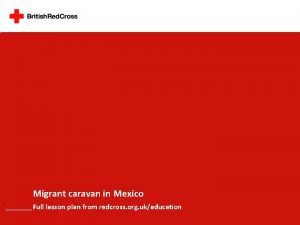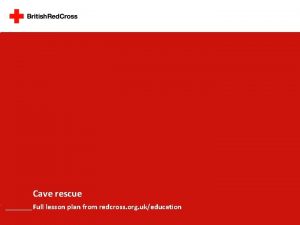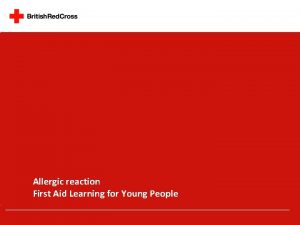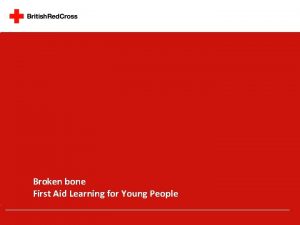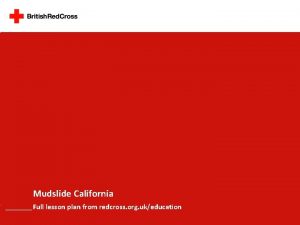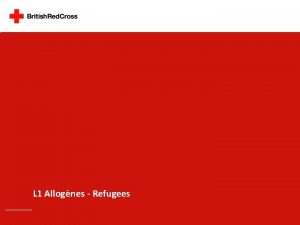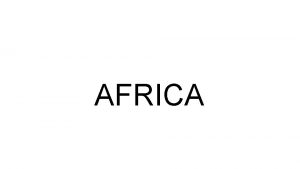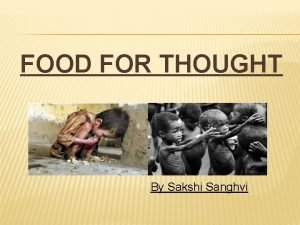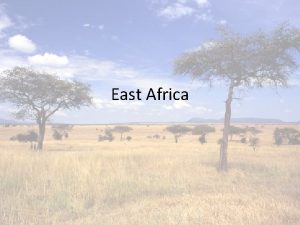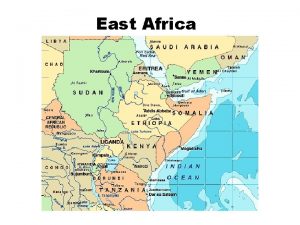East Africa Facing facing Food hunger Children Crisis



















- Slides: 19

East Africa. Facing facing. Food hunger Children Crisis Full lesson plan from redcross. org. uk/education

Think about these two questions: 1. What is famine? 2. What is drought?

Talk to a partner Have you heard that East Africa is at risk of famine? What do you know about the crisis? How did you find out about it? What was your immediate reaction? What do you know about the food shortages in South Sudan, Ethiopia, Somalia and Kenya? Would you like to know more? Can you remember any photos or videos of the people in the countries? How do the images make you feel?

Why are some communities in danger of not having enough food to eat? Watch this video to find out.

Let’s look at some photographs. Think about the following questions: 1. Which photo do you find most moving? 2. Which do you want to know more about? 3. Which do you consider typical of scenes of food shortage? Which are not so typical? 4. What words describe how the people in the photos might feel – positive, despairing, shocked, determined?

“Lots of our animals have died … which is affecting our health and the health of our children, because we depend on the animals and their products. ” 25 -year-old Bekemalicha with her son in the remote village of Badanrero, northern Kenya








1. Which photo do you find most moving? 2. Which do you want to know more about? 3. Which do you consider typical of scenes of food shortage? Which are not so typical? 4. What words describe how the people in the photos might feel – positive, despairing, shocked, determined?

Imagine yourselves in the situation of the people in the photos. 1. Would you want your photo shared across the world or not? 2. What else would you want people in other countries to know about your situation? 3. Do you simply want help from others, or the means to help yourselves?

Can you match the letters and numbers correctly? 1. Yemen imports over 90 per cent of its 2. A drought doesn’t always mean disaster, as 3. One of the main causes of recent food shortages is 4. As well as food, emergency air drops often contain a. seeds and tools so people can grow food for themselves next season. b. conflict, as people can no longer access their land to grow food. c. food, so it is vulnerable if conflict stops food entering the country. d. communities have developed ways to cope with a lack of rainfall.

People’s choice Scenario 1: Your animals are your livelihood: you depend on them for milk, food and wool for trading. Food shortages mean it is getting harder to keep the animals healthy. Do you sell the animals to raise money for your family? If you delay the decision, the animals will get sick and it will be hard to sell them. If you sell them now, you will have no income once the money runs out. Scenario 2: You haven’t had a regular supply of food for months. The price of food in the local market keeps going up. Your family is always hungry. You have some tools and some seeds you could sell. Do you sell them? That is a temporary solution, but after that you have nothing left. Scenario 3: You have heard that a charity will be providing food to those in need. But the place you have heard about is many days’ walk away. Do you and your family take that journey? Some family members are already very weak. You are not sure whether the information you have is accurate Scenario 4: You run a small local food shop. Normally business is OK. But your customers have recently lost many of their animals and cannot afford food. They ask to take food now and pay you back when they have enough money. Do you give them some of your stock, knowing that they may not be able to pay you back for a long time?

Photo credits and captions, part 1 Photo 1 Caption: 25 -year-old Bekemalicha and her son in the remote village of Badanrero, northern Kenya, April 2017. Photo: Riccardo Gangale / British Red Cross Photo 2 Caption: A small child being weighed by a Kenyan Red Cross nutritionist in Badanrero, Kenya, April 2017. Photo: Riccardo Gangale / British Red Cross Photo 3 Caption: People waiting to receive supplies from the government in the town of Dilla, northwest Somalia, April 2017. Photo: Arie Kievit / Netherlands Red Cross Photo 4 Caption: 200 families receive supplies from the government in the town of Dilla, Somalia, April 2017. Photo: Arie Kievit / Netherlands Red Cross Important legal note This photograph is fully protected by copyright. Schools and other educational organisations are free to use it for educational use. The licence does not extend beyond this use. This means that anyone wishing to put the image on a website, crop or edit it, or use it in any other way, must first contact the copyright holder and negotiate a licence for the use they require. This resource and other free educational materials are available at redcross. org. uk/education The British Red Cross Society is a charity registered in England Wales (220949) and Scotland (SCO 37738).

Photo credits and captions, part 2 Photo 5 Caption: A boy enters a dried-up well in the village of Garabis, Somaliland, April 2017. Photo: Arie Kievit / Netherlands Red Cross Photo 6 Caption: Animals who have died of hunger and thirst in the town of Dilla, Somalia, April 2017. Photo: Arie Kievit / Netherlands Red Cross Photo 7 Caption: Ikran Mohamed, aged 19, takes care of her sheep in the town of Dilla, Somalia, April 2017. Photo: Arie Kievit / Netherlands Red Cross Photo 8 Caption: Clean water splashes into an onion tank installed by the ICRC in Matabaan, Somalia, April 2017. Photo: Mohamed Abdulkadir Farah / ICRC Important legal note This photograph is fully protected by copyright. Schools and other educational organisations are free to use it for educational use. The licence does not extend beyond this use. This means that anyone wishing to put the image on a website, crop or edit it, or use it in any other way, must first contact the copyright holder and negotiate a licence for the use they require. This resource and other free educational materials are available at redcross. org. uk/education The British Red Cross Society is a charity registered in England Wales (220949) and Scotland (SCO 37738).
 Myasthenic vs cholinergic crisis
Myasthenic vs cholinergic crisis Zero hunger programme south africa
Zero hunger programme south africa Horizontal movement of air is called
Horizontal movement of air is called North american
North american East is east and west is west
East is east and west is west East africa landforms
East africa landforms Private safaris kenya
Private safaris kenya Describe the characteristics of equatorial climate
Describe the characteristics of equatorial climate Are west african bantu
Are west african bantu African beliefs
African beliefs Chapter 19 human geography of africa
Chapter 19 human geography of africa Which ocean borders africa on the east
Which ocean borders africa on the east Lesson 1 physical geography of south america
Lesson 1 physical geography of south america Gtr east africa
Gtr east africa Nationalism in africa and the middle east
Nationalism in africa and the middle east Unit 2 food food food
Unit 2 food food food Sequence of food chain
Sequence of food chain A storm system moves 5000 km due east
A storm system moves 5000 km due east A bear searching for food wanders 35 meters east
A bear searching for food wanders 35 meters east A bear searching for food wanders 35 meters east
A bear searching for food wanders 35 meters east
